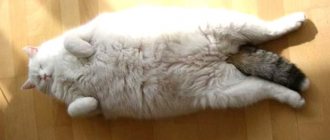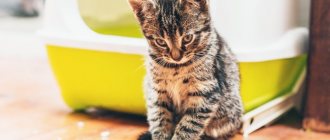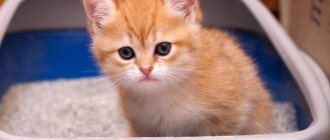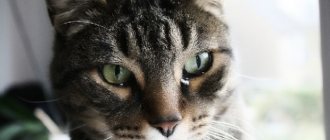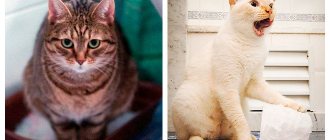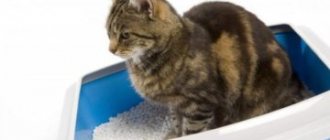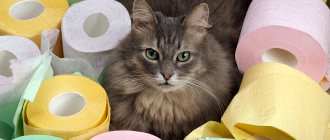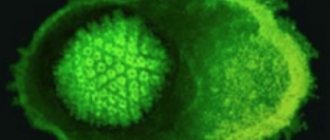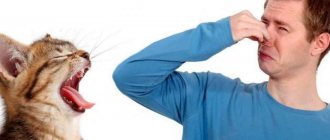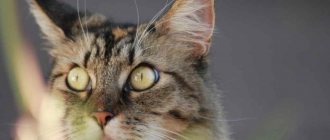Why does diarrhea occur?
Abnormal bowel movements in animals, as in humans, are accompanied by a number of unpleasant symptoms - abdominal pain, weakness, lack of appetite, nausea and often vomiting. Factors of diarrhea can be physiological and pathological. Physiological ones are characterized only by eating disorders. Felines are predators. In nature, they feed exclusively on the meat of prey, always along with the skin, fur, feathers, and bones of the victim. In this way, wild cats receive all the necessary nutrients, micro and macroelements and vitamins.
Pets are forced to eat what their owner offers them. Often this is food from a person's table. It does more harm to the cat than good.
The cat should be fed high-quality food of at least premium class. And if we are to switch to natural nutrition, then the approach to this issue must be serious - the diet must contain raw frozen meat (preferably poultry), some vegetables, some cereals, additional micro- and macroelements, for example, taurine.
Pathological factors of diarrhea always signal a dangerous disease. The most common:
- helminthic infestation;
- infectious diseases of the gastrointestinal tract;
- liver diseases;
- some diseases of the kidneys and biliary tract;
- diabetes;
- intestinal obstruction;
- oncological diseases of the gastrointestinal tract;
- other factors - stress, overeating, switching to a new type of food or water, sunstroke or heatstroke, hairball in the stomach, food allergies, foreign objects entering the food tract.
We also recommend reading the article about vitamin deficiency in cats.
Diarrhea in cats due to pancreatic dysfunction: how to treat it?
Treatment of diarrhea due to pancreatitis
The pancreas in cats is as vulnerable as in humans. In view of this, if it is overloaded in the body, the enzyme that is responsible for the absorption of food ceases to be produced. As a rule, as soon as this happens, the animal immediately begins to have severe diarrhea.
A characteristic sign of pancreatitis is a pronounced sour smell of feces. Therefore, if you notice this sign, then go to the vet immediately. If you delay treatment of this pathology, your cat may develop diabetes or even sepsis.
Treatment of diarrhea due to pancreatitis is carried out with the following drugs:
- Anthelmintic
- Antiviral
- Antibiotics
- Antiemetics
- Heartfelt
- Anti-inflammatory
- Analgesics
Yes, and in this case you must remember that a sick cat should eat as lightly as possible. This means that during treatment, fatty meat and fish, as well as dry food, must be completely excluded from her diet.
All this time, give her boiled rice and oatmeal, and sometimes dilute it all with a small amount of chicken or turkey. When the animal begins to recover, you can begin to introduce dairy products and usual foods into its diet.
Symptoms
Normally, a cat's stool is brownish in color with a characteristic odor, no more than once or twice a day. With indigestion, the color, appearance, smell and frequency of stool changes. Symptoms of problems in the gastrointestinal tract of a cat are:
- Bowel frequency. If defecation occurs three to five times a day, then the animal can be observed, limited in diet and offered to drink more. If the intensity of diarrhea increases, you should seek help from a veterinarian.
- The color of the excrement characterizes the factors that caused the diarrhea. If the color of the stool is green (yellow), the intestines are most likely affected; black or red color indicates the presence of blood in the stool; light to white - indicates liver disease.
- Consistency. If feces are poorly formed and abundant, the animal is likely to overeat. Liquid, watery, foamy stools indicate infectious bowel diseases
- Smell. All intestinal diseases are accompanied by an unpleasant smell of feces that is uncharacteristic for a healthy cat - putrefactive, spoiled food, etc.
- Time. Diarrhea lasting several days or up to a week is considered acute; chronic diarrhea lasts more than seven days; intermittent indigestion is characterized by periodic recurrence within a month.
Treating a kitten for diarrhea at home
Let's talk about those cases when you can carry out treatment and adjustments at home yourself.
Treatment of newborn kittens
The normal state of the kittens’ body allows the intestines to function as expected, therefore, their feces can be mushy or shaped, yellow or mustard in color. Defecation can be seen up to 4 times a day. From this it follows that diarrhea will be considered liquid, semi-liquid and foamy consistency with a different color palette: black, red, green feces, as well as feces with the presence of gray mucus, helminths and their eggs.
If the cause is a bacterial infection, then you need to take antibiotics, and if the infection is viral, then, accordingly, an antiviral drug.
Worm infestation is treated with anthelmintics, allergies with antihistamines.
What to feed newborn kittens
Symptoms in newborn kittens increase quickly; it is not always possible to immediately seek qualified help - first aid is needed immediately. The cat needs to be given the drug “Smecta” or “Enterosgel”, they will remove toxins.
In case of severe stool upset, you can treat your baby with loperamide at the rate of 0.1 mg per 1 kg of weight.
If there is noticeable dehydration, you need an injection under the withers of Ringer-Locke drug or saline solution. In total, pour no more than 3 ml.
Useful information: How to give an injection to cats
Treatment of a one-month-old kitten
Symptoms of diarrhea in a one-month-old baby will include frequent loose bowel movements with an uncharacteristic odor and color. In the absence of high body temperature or pathological impurities in the stool, you can be treated at home, but otherwise you should take the patient to the doctor.
The first step is to remove from the menu the food that supposedly became the catalyst for diarrhea. You will have to remember what the baby ate in the last days before the illness. Especially if something new was introduced into complementary foods.
global $ads_google; //data-ad-slot=”2475549904″ $ads_google = empty($ads_google) ? false : true; ?> if ($ads_google == false) {?>
$ads_google = true; ?> } ?>
Often, diarrhea at this age is only a reaction to the abrupt weaning of the mother cat with a change to fermented milk food, or cow's milk. Food for adult cats will cause the same reaction.
You should not feed your little cat food from the owner’s table, namely meat, fish, sausage, which is what you usually want to pamper your pet with. At this age this shouldn't happen at all.
What to feed kittens at 1 month
You can make the cat starve for up to 12 hours, and then they begin to feed the rice broth, namely the liquid in which it was boiled. You can give your baby Smecta and Enterosgel, but it is important to follow a diet.
It is important to provide the young body with peace: do not insist on games or frighten it with loud sounds. Stress is not the best help at this time.
Treatment of kittens at 2 months
When a kitten is two months old and suffers from diarrhea, this is often due to a change of place of residence - older cats are given to new owners. But they, in turn, are not very well prepared for such responsibility and have not clarified for themselves all the subtleties of the issues of feeding a pet.
The first thing that should come to mind is stress. For a small cat, this is a change from the familiar world to a new environment, new people, so the body can react in a similar way. It is important to make the new tenant feel that he will be comfortable, calm and happy here.
You can immediately take the baby to a cozy corner, where he himself would begin to master his future possessions. Adaptation will happen faster, diarrhea will be quickly forgotten.
What to give a kitten at two months
If the reasons are more significant, then you can relieve intestinal spasms with papaverine. You also need to thoroughly find out what diet the previous owners followed - if a different diet is planned, then the transition to it should be as smooth as possible.
Diarrhea in three month old kittens
Three-month-old male cats are already bundles of energy and strength, but diarrhea can overtake them too. The reasons may be overeating, eating dangerous substances, or the process of deworming.
Naturally, each body can react in its own way to getting rid of parasites, the main thing is that the loose stools are not prolonged.
Treatment of diarrhea in kittens at 4 and 5 months
When a cat reaches four months, he may already suffer from diarrhea, like his adult counterparts.
Stress can be cited as a cause if:
- a visit to the veterinary hospital took place;
- new pets have settled in the house;
- children showed excessive activity in games;
- there are fears of loud objects and sounds;
- a move to a new place of residence took place;
- it was a long road;
- the menu has changed;
and also if there are diseases of the gastrointestinal tract.
global $ads_google; //data-ad-slot=”2475549904″ $ads_google = empty($ads_google) ? false : true; ?> if ($ads_google == false) {?>
$ads_google = true; ?> } ?>
For 4-5 month old cats, individual treatment is prescribed, but first an examination is carried out to identify significant health-related causes.
The cat has diarrhea and vomiting
Diarrhea is always accompanied by dehydration. If diarrhea is accompanied by vomiting, it happens faster. In this case, the pet requires urgent help. Most often, vomiting occurs as a reaction to an external negative influence - poisoning of a cat with poor-quality food, chemicals or drugs, due to heat stroke.
But sometimes it can indicate severe infections of the gastrointestinal tract, as a result of diseases of the liver and gallbladder, kidneys, pancreas or cancer.
Vomiting with foam during diarrhea is an even more alarming symptom, most often accompanying such dangerous pathologies as panleukopenia, infectious peritonitis, enteritis, and others. You should urgently take your pet to the veterinary clinic. Although sometimes white foam during vomiting indicates, on the contrary, an empty stomach, it occurs during long periods of fasting.
What else causes diarrhea?
Dysbacteriosis intestinal microflora caused by:
- taking medications such as antibiotics, diuretics, cardiotonic and myasthenic drugs, sedatives;
- dietary disturbances and nutrient imbalances;
- poisoning with toxins of organophosphorus compounds and insecticides, for example, when deworming or removing lice, carrying out repairs, eating spoiled foods, etc.;
- strains of pathogens of infectious viral and bacterial diseases.
Diarrhea can begin with acute intestinal infections that disrupt or paralyze the gastrointestinal tract, accompanied by dysbacteriosis, bloating, spasmodic pain, vomiting, temperature fluctuations, and a general depressed state of the cat. For example, gastritis.
Gene mutation, which often goes hand in hand with the breed of the animal, provokes a number of hereditary diseases, including secretory pathology, such as imperfection of transport proteins of the intestinal walls. In this case, the kitten has had diarrhea from the first day of birth, it is impossible to stop the development of the pathology, and the question is: “What can you give a cat for diarrhea?” - makes no sense. It is impossible to cure a hereditary disease; you can only adjust the composition of the food and take special medications in order to prolong the cat’s life as long as possible.
Many cat diseases, which are characterized by such a phenomenon as diarrhea, can become chronic.
Such diseases include:
- catarrhal gastritis;
- peptic ulcer;
- enteritis;
- parenchymal hepatitis;
- colitis;
- inflammation of the bile ducts and gallbladder;
- terminal ileitis;
- some infectious diseases, after which the cat remains a lifelong virus carrier.
Loose stools can be caused by “invisible killers” - growing tumors (hormone-producing) that are difficult to identify until they become visible to the naked eye or with a high-quality veterinary examination.
A lack or excess of vitamins and minerals also leads to gastrointestinal disorders - diarrhea in cats, changes in the skeletal system and perversion of appetite.
Infection with worms - helminthiasis - causes frequent disruption of normal bowel movements.
Giardiasis is the cause of chronic diarrhea in cats.
Attention! Giardia is not helminths or bacteria! This is a special unicellular parasite Giardia (lat.), the expulsion of which is possible only with antiparasitic agents.
A person communicating with a Giardia-infected cat is at risk!
An allergic reaction and a reaction to stress or nervous overstimulation may include excessive urination and acute diarrhea.
What to give a cat for diarrhea in each specific case depends on the correct diagnosis of diarrhea.
Diagnostics
To diagnose the disease that caused diarrhea in a cat, the following methods are used in veterinary medicine:
- Compiling a medical history. The veterinarian collects data on the nature, duration and frequency of stool, studies associated factors, and the presence of vaccination. Be sure to evaluate the appearance and objective condition of the animal. The factors of diarrhea are determined - external or gastrointestinal.
- A diagnostic examination of stool is carried out - biochemical examination, laboratory assessment, testing for reoviruses.
- If necessary, radiographic and ultrasound examination of the abdominal cavity is prescribed to identify foreign bodies and neoplasms
- Secondary cytological examination of a rectal smear.
- Study of markers for pancreatic insufficiency and pancreatitis, culture for salmonellosis, PRC analysis (polymerase chain reaction).
- A biopsy is prescribed for chronic diarrhea if all other methods have failed to determine what caused the disease.
How many drops of ASD should I give my cat for diarrhea?
Using ASD drops for diarrhea in cats
I would like to say that ASD is a fairly powerful drug, so it must be given to a cat carefully. It will be better if you first give her the smallest dose, and only after making sure that everything is fine, will you treat with this remedy.
As practice shows, if the active substance is well tolerated, recovery occurs within 48 hours. This preparation is very simple. You will need to measure out 5 cubes of water and dissolve 3-5 drops of the product in it. After thorough mixing, it can be given to a sick animal.
Treatment
If your cat’s diarrhea is short-lived, no more than three to five days, and is not aggravated by vomiting and other factors, you can try to cope with it on your own.
The first thing to do is to provide the cat with plenty of fluids and introduce a fasting regime. For an adult animal, it is advisable to go twenty-four hours without feeding. If diarrhea occurs from poor-quality food or food poisoning, then these measures will effectively help solve the problem. The body will cope with negative effects on its own. We recommend reading the article about how long a cat can go without food; this is important to know before putting your pet on a hunger strike.
But in case of pathological diarrhea, you should not waste time and self-medicate. After diagnosing and identifying the causative agent of the pathology, the veterinarian will prescribe treatment using one of the following agents or their complex:
- antibiotics;
- antiviral and antimicrobial agents;
- enzymes;
- enterosorbents;
- immunostimulants;
- probiotic substances;
- droppers to eliminate dehydration;
- prescribing disinfectant measures (enema, gastric lavage).
Particular attention should be paid to kittens under three months and young animals. Their bodies are not yet strong enough to fight the infection; dehydration due to diarrhea and vomiting often occurs within 24 hours. In addition, these animals have not yet been vaccinated and the risk of developing panleukopenia and other dangerous viral pathologies increases. Be sure to read the article about diarrhea in kittens.
In any case, if the animal’s diarrhea is prolonged and is accompanied by additional unfavorable symptoms, the help of a veterinarian is necessary.
What can you give to a cat if it has diarrhea, loose stools: list of medications, tablets, antibiotics
List of medications for diarrhea
Before introducing you to the list of medications to combat diarrhea, I would like to clarify that in order for the medicine to have an effective effect on the mucous membranes of the gastrointestinal tract, they must be completely cleared of food. In order to achieve a similar effect, it will be enough to remove all food by approximately one knock. During this time, you will have to give your pet only water.
If he refuses to drink it, then you will have to force him to drink. You can give your cat something to drink using an ordinary medical syringe. All you have to do is draw water into a syringe, pick up your pet, fix its head and inject water into the oral cavity in small portions. If you want water to be beneficial for the stomach and intestines, then dissolve a packet of rehydron in it.
List of medications for diarrhea:
- Enrofloxacin. Will help cope with bacterial infection. Can be given to the animal orally or administered intramuscularly
- Gentamicin. Attributed to the animal if diarrhea has led to the development of sepsis. It is better to administer the drug intramuscularly
- Tylosin. This remedy is ideal for the treatment of infectious diseases. It can only be administered intramuscularly
- Glucose . Needed to restore water balance and normalize the functioning of the cardiovascular system
- Activated carbon . An absorbent that effectively removes toxins from the body
- Enterosan. Normalizes digestion
- Ainil. This medicine will help you reduce body temperature to normal levels, and also relieve the animal from spasms.
- Lactobacterin . Help restore the microflora of the stomach and intestines
- Azinox. An antiparasitic agent that will help you get rid of helminths
What to do depending on the color of stool
- Diarrhea with mucus and traces of blood often indicates that the animal is infected with worms (helminths). In the initial stage, deworming can help. But such stool can also signal inflammation of the small intestine; in this case, the issue can only be resolved by complex therapy under the supervision of a doctor.
- Green diarrhea signals putrefactive processes in the intestines. May occur due to food poisoning or infectious diseases. In this case, antibacterial treatment is prescribed.
- Yellow stool indicates excess bilirubin in the stool. Often accompanies liver disease and requires serious treatment.
- Excessively light-colored stool indicates a deficiency or absence (white stool) of bilirubin. Most likely, the bile ducts are closed; bile accumulates in the liver and is not excreted from the body. You should immediately contact a veterinary clinic.
- Red or black stool, with scarlet streaks, most often, if the animal has not consumed food of a characteristic color, or iron supplements, indicates the presence of blood in the feces. Consequently, gastric or intestinal bleeding is present. In this case, only a specialist can determine the nature of the pathology and prescribe treatment.
A cat has bloody diarrhea, with mucus, and vomiting: what to do, treat it at home or see a doctor?
Treating a cat for diarrhea
As you probably already understood, quite serious pathologies can provoke diarrhea in a cat. In view of this, it will be better if you immediately begin to take measures when loose stools appear. As for bloody diarrhea with mucus and vomiting, its occurrence must be treated as responsibly as possible. As practice shows, the cause of its appearance can be either obstruction of the entire intestine, or severe inflammation of only the colon.
If blood has already appeared in the stool, this indicates that the mucous membranes of the gastrointestinal tract are so inflamed that they have begun to become covered with wounds. This means that without proper and, most importantly, immediate therapy, the animal will inevitably die. I would like to say right away that such pathologies must be treated under the strict supervision of a specialist. Therefore, it will be better if you take your pet to the veterinarian as soon as possible. This pathology is treated in several stages.
At first, the animal is given drugs that stop the bleeding. This could be, for example, Dicynon . It is given to the animal 2 times per knock, 0.5 - 1 ml at a time. In addition, the cat is given ordinary clean water along with the drug. As soon as the bleeding stops, you can move on to blocking inflammation and restoring the microflora. For these purposes, sick animals are prescribed Metronidazole (20 mg per kilogram of body).
How to help a cat yourself
There is no need to panic at the first sign of an upset stomach in your cat. You can try to stop diarrhea with your own remedies. The following methods can help normalize digestion:
- Deworm the animal, especially if it has not been done for more than three months. Often this measure helps solve the issue of normalizing digestion if the problem is a helminthic infestation.
- If there is a suspicion of poisoning, you should give the cat sorbents - activated carbon, Enterosogel, Smecta.
- An unfavorable reaction to a change in food can be eliminated by eliminating the new product from the animal’s diet.
- In case of allergies, you can alleviate your pet’s condition with the help of antihistamines - Diphenhydramine, Diphenhydramine. If the reaction is caused by the flea collar, it must be removed.
- If the animal has diabetes, then diarrhea may be caused by a violation of the diet. You should establish proper nutrition for your pet and follow all doctor’s orders on time.
- A cat with diseases of the liver, kidneys, or gall bladder should be kept on special dry or wet food until contacting a doctor.
- If you suspect that indigestion is caused by hairballs, you should give your pet a special paste to remove them.
- For intestinal diseases, a special diet (gastrofeed) will help. If the stool does not return to normal within a few days, you can use tablets from a “human” pharmacy - Ftalozol, Enetrofuril, Furazolidone. You just need to remember to follow the dosage.
- In all cases of indigestion, the animal should receive as much fluid as possible and a special diet. Sometimes a wet fast for up to forty-eight hours (for adults) helps.
- If dehydration is suspected, a subcutaneous infusion of Ringer's solution, Ringer-Locke solution, glucose with vitamins B and C will help.
How to treat diarrhea in cats with folk remedies: recipes
Folk remedies for diarrhea: recipes
The easiest way to help your cat cope with diarrhea is to feed it boiled rice. First, you will need to boil it until completely cooked, drain the excess liquid from it, and after that you can give it to your pet. This remedy is also good because in this case not only the cereal itself will be useful, but also the liquid in which it was boiled.
If the animal categorically refuses to eat rough food, you can draw rice water into a syringe and feed it that way. Once in the stomach, the rice broth will begin to envelop the walls of the stomach and intestines, thereby preventing toxins from having a harmful effect on them.
Moreover, it is this kind of decoction that is better than other means in helping to remove toxins. However, you must remember that such a remedy can also be dangerous. If you don’t want your cat’s stomach to completely stop processing food, then try to alternate rice water with some healthy food, for example, boiled protein.
Bonding agent
- Measure out 60 ml of water and bring to a boil
- Place 1 teaspoon of crushed oak bark in it and place everything in a steam bath
- After 15 minutes, remove the product from the heat and let it cool to room temperature
- Divide it into 4 parts and use a syringe to inject into the cat's mouth
Anti-inflammatory
- To prepare this medicine you will need dried sage and wormwood.
- They will need to take 1/2 tsp each, pour in all 80 ml of boiling water and simmer over low heat for 15 minutes.
- After complete cooling, the product will be ready for use.
- You will need to strain it and give it to the sick animal in small portions throughout the day.
What to feed during diarrhea
Diet for digestive disorders is very important. To alleviate your cat's condition, you should:
- provide plenty of fluids;
- exclude dairy products, and ideally almost all products from the human table;
- introduce a starvation diet for up to twenty-four, and sometimes forty-eight hours for an adult cat, up to twelve hours for a kitten;
- introduce special medicinal food into the diet - many leading manufacturers of food for cats have “gastro” and gastrointensive lines in the form of dry and wet food;
- you can try giving rice water;
- introduce sorbents into the diet;
- sometimes the use of folk remedies helps - decoctions of chamomile, oak bark, St. John's wort;
- introduce probiotics into the diet (Linex, Baktisubtil).
What to do if a pregnant cat has diarrhea
Diarrhea in a pregnant female should definitely cause concern for the owner and take measures to normalize her digestion.
Although diarrhea often occurs as a result of simple overfeeding of a pregnant woman. Her diet should be normalized and new foods should not be introduced into the expectant mother’s diet unnecessarily, since intolerance to certain foods may occur during this period.
If you cannot normalize the female’s stool on your own, you should immediately consult a veterinarian - after all, medications are currently contraindicated for her.
If a helminthic infestation or flea infestation is suspected, the issue of eliminating these factors must be resolved immediately and only under the supervision of a specialist. After all, future offspring may also suffer.
Due to physiological factors, loose stools often occur in young mothers in the first days after childbirth. The female usually eats a lot of afterbirth and drinks a lot, in addition, hormonal changes in the body occur. Usually within a week the stool returns to normal.
Correct prevention
Proper prevention often helps to avoid such an unpleasant phenomenon as diarrhea in a pet. To do this, you need to follow simple measures:
- Vaccinate your animal against common diseases in a timely manner (Tricket, Quadriket, Nabivak, Multifel vaccinations);
- carry out deworming quarterly and before each vaccination;
- use treatment against fleas, ticks, and other external parasites annually and before going outdoors;
- monitor the cleanliness of water and food bowls and litter trays;
- carry out daily wet cleaning with disinfectants of premises where pets are kept;
- Regularly wash or steam cat houses, beds, and bedding;
- provide the correct diet and nutrition for the cat using premium or super-premium wet and dry food;
- if the animal suffers from chronic diseases, provide it with special medicinal food and means;
- be attentive to the health of a pregnant cat and newborn kittens, monitor the slightest changes in their behavior, provide proper nutrition;
- Visit your veterinarian regularly for routine examinations of your pet.
Diarrhea due to viral infection
In the case of a viral infection, everything is very serious.
Since there is no specific drug that would act on viruses, treatment should be symptomatic.
Only a veterinarian can prescribe complete and correct treatment.
In especially severe cases, it is recommended to leave the animals in a hospital under the supervision of doctors.
In case of a severe illness, the cat should be admitted to hospital.
It is important to understand that viral infections in cats can be fatal if treated untimely or incorrectly. There is a certain risk if you go to the clinic in a timely manner, so in the case of viral diseases it is better to prevent them than to treat them.
Prevention of viral diseases is an annual comprehensive vaccination.
Unfortunately, vaccination does not provide a 100% guarantee that the animal will not get sick, but it significantly increases the animal’s chances of survival.
Vaccinated animals suffer mild viral infections.
Vaccination does not provide a complete guarantee, but still the likelihood of getting sick becomes lower.
